How to Store a Garden Hose with Easy Steps
Keeping your garden hose tidy and well-maintained is essential for a hassle-free gardening experience. But you can find it frustrating when a once neatly coiled hose transforms into a chaotic tangle. Don’t worry! In this guide, we will help you learn about how to store a garden hose to keep it organized and ready for action. With easy step-by-step instructions, you’ll bid farewell to tangles and leaks, ensuring a smooth water flow.

Why Need to Store Garden Hose?
Prevent Damage
Proper storage is a must to ensure your garden hose stays in top condition. Cracking, fading, and leaks can occur when the hose is exposed to harsh conditions, such as direct sunshine and subfreezing temperatures. By storing your hose in a cool, dry place and away from the elements, you prevent these issues and extend its lifespan.
Extend Lifespan
Effective storage practices can significantly prolong the life of your garden hose. When coiled neatly and stored off the ground, you reduce the risk of kinks, tangles, and abrasions. These problems weaken the hose and can result in leaks or even bursting. By coiling the hose properly and using hose reels or hooks, you minimize wear and tear, saving you money on replacements.
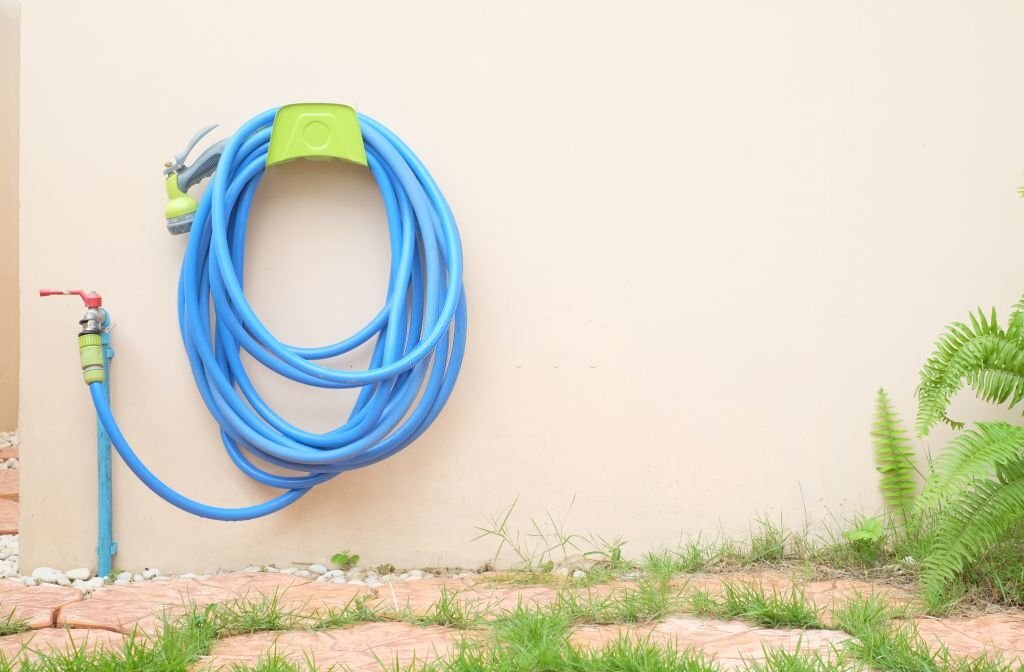
Maintain Aesthetics
A well-maintained garden reflects the care you invest in your outdoor space. Leaving a hose lying around can create an eyesore, disrupting the beauty of your garden. Proper storage will enhance the aesthetics of your surroundings by keeping your hose neatly tucked away.
Ease of Use
Organized hose storage directly translates to convenience during your gardening tasks. Imagine the frustration of wrestling with a tangled hose while trying to water plants or wash your car. With proper storage, you eliminate this hassle. Neatly coiled hoses are easy to unwind and use, saving time and ensuring a smooth watering experience.
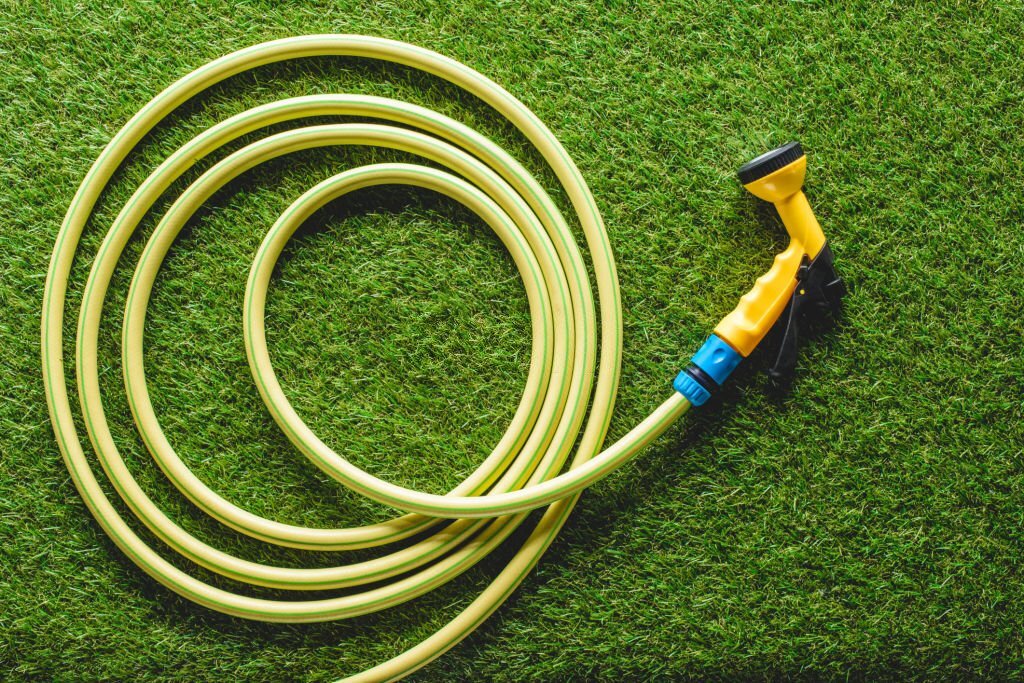
How to Store a Garden Hose in 8 Steps?
Step 1: Clean Thoroughly
Clean up any mud, dirt, or debris accumulated during use. This helps prevent clogs and ensures a fresh start when you use the hose next season. To clean the hose, simply rinse it with water and scrub gently if needed. Once cleaned, hang the hose in an open area to air dry completely before storage.
Step 2: Inspect for Damage
Inspect your garden hose carefully for any signs of damage, such as cuts, cracks, or leaks. Before storage, you can prevent further deterioration and extend the lifespan of your hose by identifying and addressing these issues. If you come across any damage, consider repairing it using appropriate hose repair kits or methods.
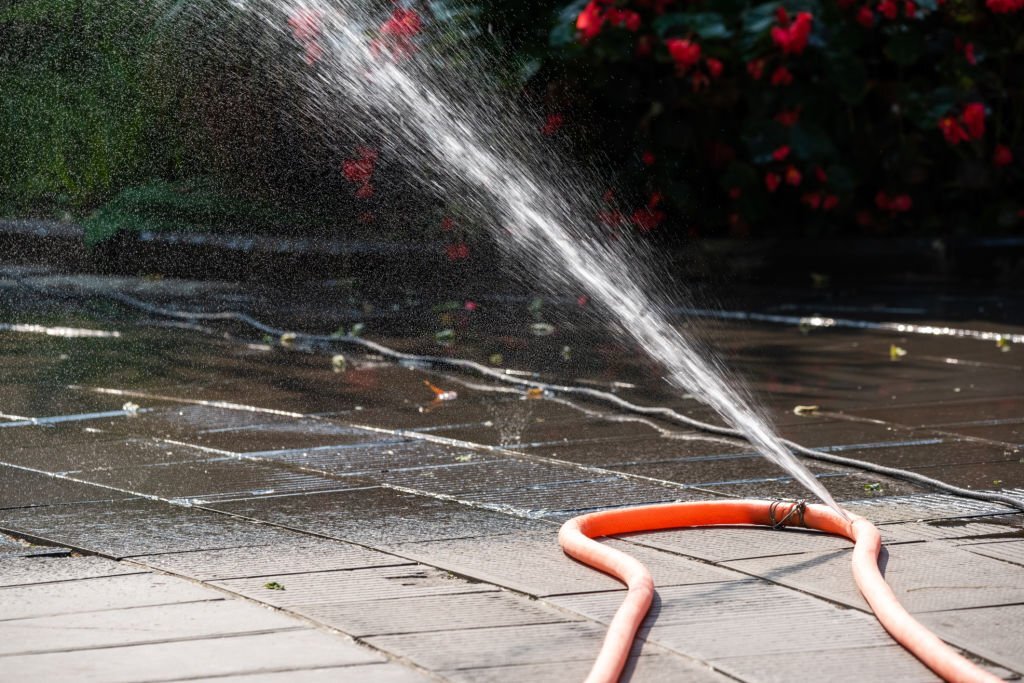
Step 3: Remove Attachments
Detach nozzles and connectors to prevent moisture buildup and potential corrosion. These attachments can trap moisture, potentially leading to corrosion and damage over time. Detaching them from the hose allows them to dry thoroughly and prevents potential issues. Store the attachments separately in a dry and cool place to ensure they remain in good working condition.
Step 4: Proper Coiling
Properly coiling your garden hose is essential to prevent kinks and tangles that can damage the hose and make it challenging to use. Start by holding one end of the hose and make large, even loops as you work your way to the other end. Avoid sudden twists or bends that could cause kinks. Once coiled, secure the hose with twist ties or hose straps to keep it neatly organized.
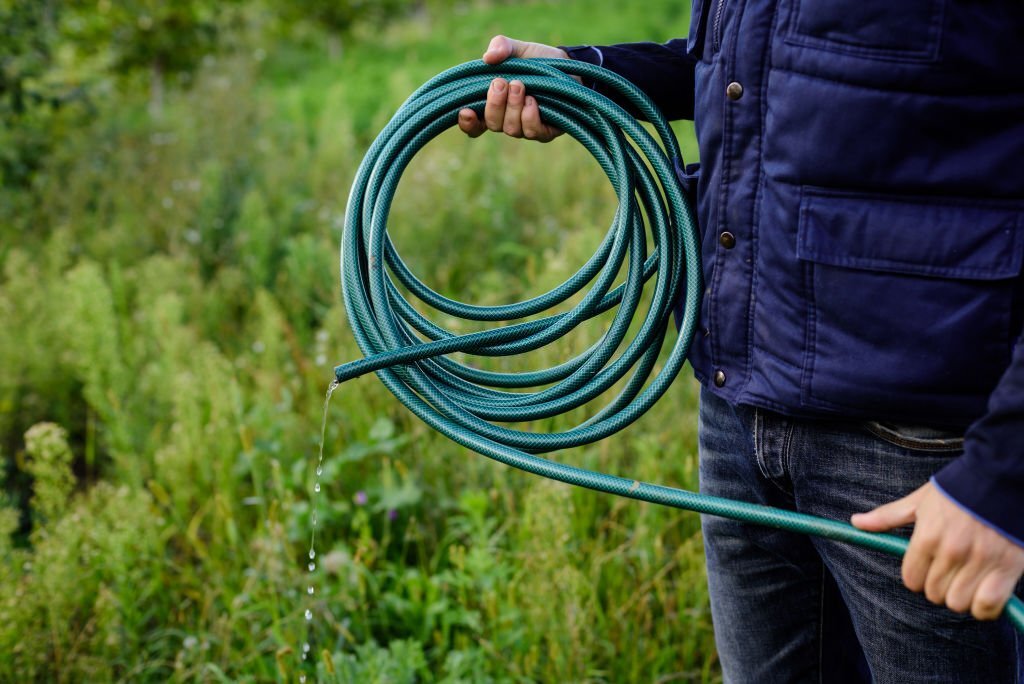
Step 5: Protect from Other Elements
Consider using a hose reel, storage box, or dedicated hose hanger to safeguard your garden hose from the elements. These alternatives keep the hose elevated and protected from harsh weather, high temperatures, and direct sunshine. Exposure to UV rays and drastic temperature changes can degrade the hose material over time, leading to cracks and leaks.
Step 6: Elevate and Protect
Elevating your coiled hose off the ground has multiple benefits. It prevents moisture from being absorbed and helps deter pests seeking shelter inside the hose. Placing a wooden board or bricks beneath the hose coil provides the necessary elevation. This step is particularly important if you’re storing your hose in a shed, garage, or any area prone to dampness.
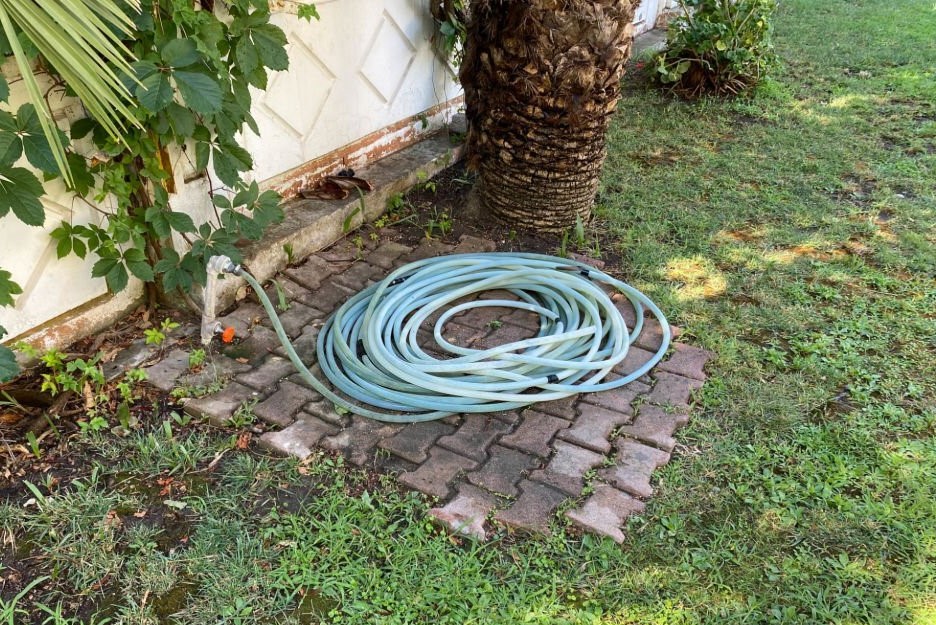
Step 7: Choose the Right Spot to Store
Selecting an appropriate storage spot for your garden hose is key to maintaining its condition. Opt for a cool, dry, well-ventilated area such as a shed, garage, or storage box. Avoid locations prone to moisture or extreme temperature fluctuations, as these conditions can accelerate wear and tear.
Step 8: Regular Checks
Even during the off-season, it’s important to perform regular checks on your stored garden hose. Periodically inspect the hose for any signs of damage, pests, or moisture accumulation. Catching and addressing issues early can prevent them from escalating and ensure your hose remains in good working order.
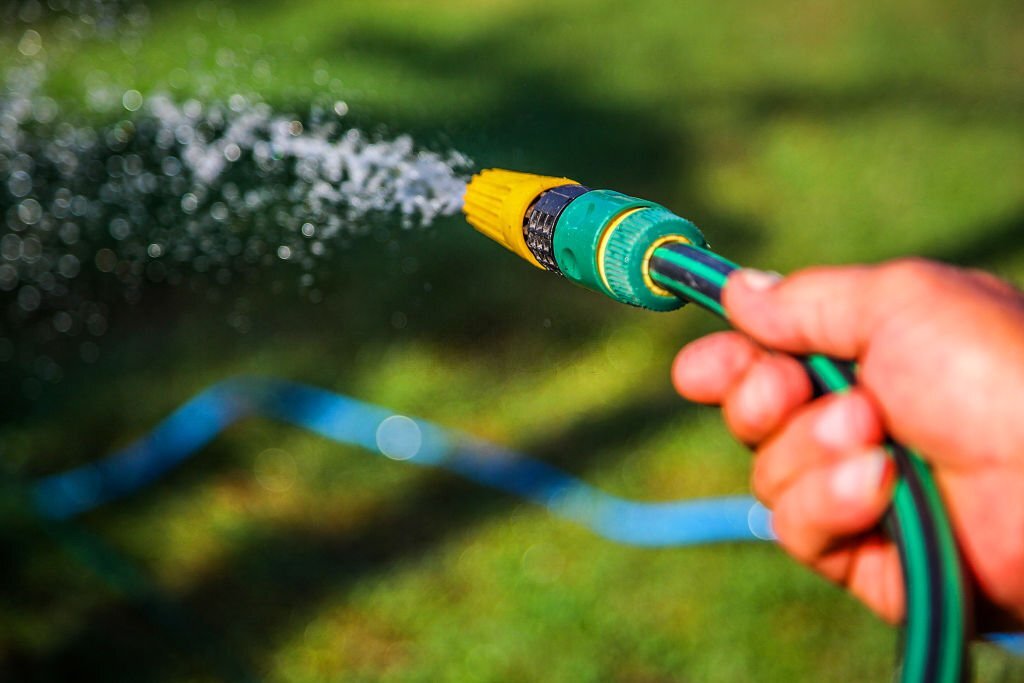
Creative Ideas to Store Your Garden Hose
Hose Hammock
Simplify hose management with the hose hammock. Suspend it, and your hose is always ready – no more tangles. This creative solution ensures easy access to your hose while adding an engaging visual element. It is simple to connect to any spot, which makes gardening a breeze and gives your outside space a lively atmosphere.
Hose Pot Planter
Elevate your garden hose storage with a hose pot planter, a harmonious fusion of functionality and aesthetics. This ingenious solution ensures an organized hose and introduces an element of beauty to your outdoor space. As you coil the hose neatly inside the pot, you seamlessly integrate practicality and charm, creating a visually appealing storage solution that enhances form and function.
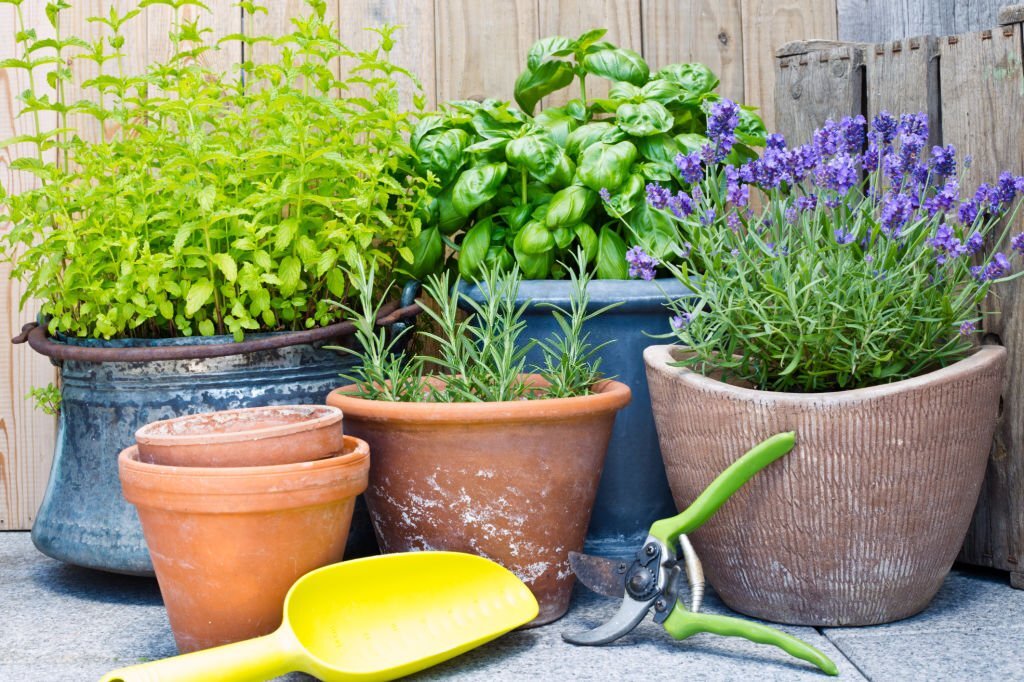
Pallet Hose Holder
A pallet can become a functional and artistic storage solution with a few simple modifications. You can secure the pallet vertically to a wall or fence and wrap the hose around its slats for easy coiling. The pallet’s nooks and crannies offer additional space for storing gardening tools or small potted plants. This DIY project keeps your hose organized and adds a charming and personalized touch to your outdoor space.
Hose Ladder
Select a hose ladder – a decorative, leaning ladder with horizontal rungs offering organized coiling space. The ladder can be suspended from sturdy hooks, leaning against a wall, fence, or both. This storage method keeps your hose kink-free and easily accessible and adds a unique design element to your garden. Choose a ladder with weather-resistant materials to ensure its durability and longevity.

Rock Garden Hose Stand
Meet the rock garden hose stand – a discreet storage hero. These inconspicuous, hollowed-out rocks serve as discreet hose holders. The rocks’ natural appearance allows them to blend harmoniously with the surrounding environment while keeping your hose organized. This solution adds an element of surprise to your outdoor space, creating an aesthetically pleasing and functional focal point.
FAQs
Can I leave my hose in the sun?
While some sun exposure is okay, prolonged exposure can damage your hose. UV rays may cause the hose material to deteriorate and become brittle. To prolong its lifespan, storing your hose in a shaded area or using hose storage solutions that provide UV protection is best.
Should I store my hose indoors for winter?
Certainly, storing your hose indoors during winter is advisable. Freezing temperatures can cause water trapped inside the hose to expand, potentially leading to cracks or leaks. Drain the hose, detach it from the water source, and store it in a dry, temperature-controlled area to prevent winter damage.
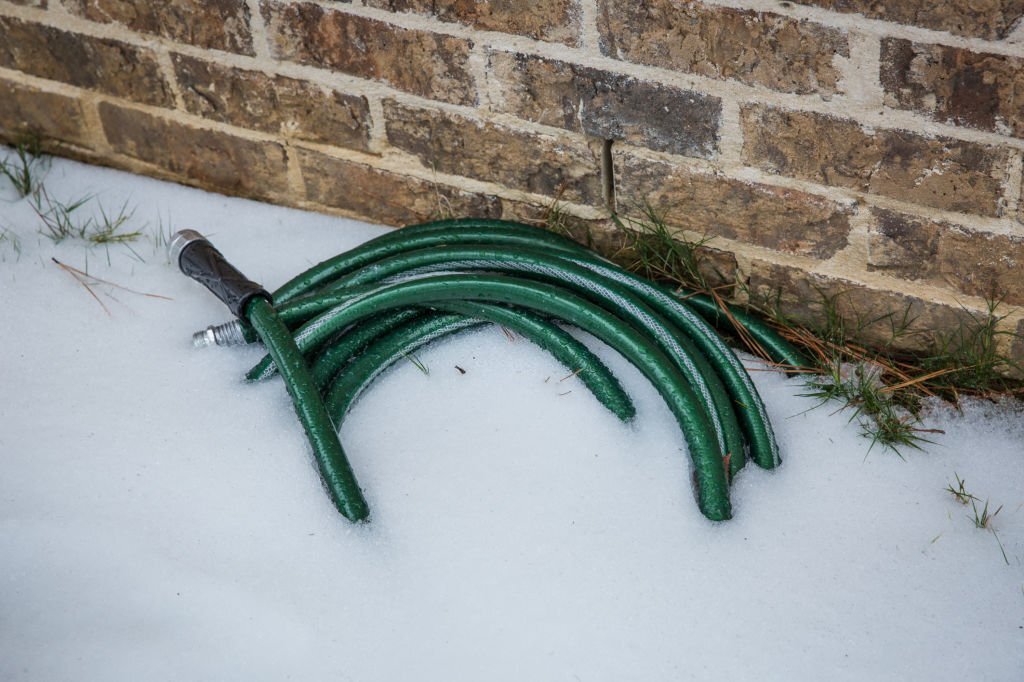
Can I store my garden hose on a hose reel?
Yes, a hose reel is a convenient storage option. It helps prevent kinks and tangles, keeping your hose neatly coiled and easily accessible. Make sure to choose a hose reel suitable for the length and type of your hose, and consider one with a cover to shield it from the elements.
How to keep the hose organized and tangle-free?
To maintain an organized and tangle-free hose, use hose reels, hangers, or storage solutions like hose pots. Coil the hose neatly after each use, avoiding kinks. Employ techniques like the “figure eight” method or looping the hose over your arm to prevent tangling.
Are there specific storage solutions for different types of garden hoses?
Yes, different hoses may benefit from specific storage solutions. For lightweight hoses, consider compact storage options like hose pots or hangers. For easy mobility, heavier hoses might benefit from wall-mounted hose reels or hose carts with wheels. Match the storage solution to your horse’s weight and length for optimal results.
Conclusion
Knowing how to store a garden hose is a simple yet vital aspect of maintaining a well-kept outdoor space. You can prolong the lifespan of your hose and maintain the aesthetics of your garden by following the advice provided in this article. From essential cleaning and proper coiling to creative storage solutions, these steps and insights empower you to store your garden hose effortlessly, enabling a seamless and enjoyable gardening experience.
Related Articles